Ladakh – Climate activist and Ladakh leader Sonam Wangchuk has been detained under the stringent National Security Act (NSA) after violent clashes over statehood demands left four dead and over 100 injured. The move, widely debated as excessive, highlights the government’s hard stance. The Sonam Wangchuk NSA detention has raised concerns over democratic rights, political motivations, and Ladakh’s fragile stability.
Detention And Transfer To Jodhpur
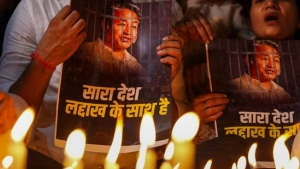
On Friday, police detained Wangchuk in Leh and swiftly flew him to Jodhpur. Officials confirmed that the Sonam Wangchuk NSA order was invoked, which permits detention without trial for up to 12 months. Sources said police, led by Ladakh chief SD Singh Jamwal, arrested him around 2:30 pm. He was later shifted to Jodhpur Central Jail.
Wangchuk’s wife, Gitanjali Angmo, recounted that more than 100 officers accompanied senior officials to their Uleytokpo home. She alleged their house was ransacked, and police provided neither a copy of the detention order nor an FIR. Angmo claimed the Sonam Wangchuk NSA move was meant to tarnish his image, calling it unjust treatment.
Government’s Stand
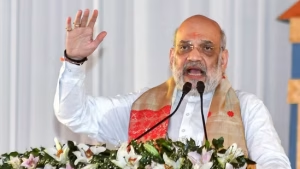
The Union government blamed Wangchuk for inciting unrest during Wednesday’s protests. Officials alleged that his speeches provoked violent crowds, forcing police to resort to tear gas and lathi charge. The Sonam Wangchuk NSA decision came a day after the home ministry cancelled the FCRA licence of SECMOL, an NGO founded by Wangchuk, citing funds used for activities against national interest.
The ministry argued the NGO received ₹4.93 lakh from a Swedish donor for programmes linked to migration, climate change, and sovereignty — subjects deemed against the nation’s interest. The government insists that the Sonam Wangchuk NSA action was necessary to prevent further instability in Ladakh.
Protest Violence And Aftermath
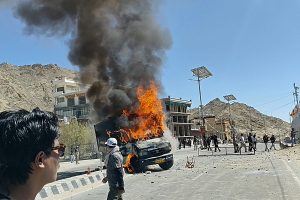

The protests on Wednesday escalated quickly, leaving four people dead and about 100 injured. Demonstrators demanding statehood and constitutional safeguards vandalised buildings, torched a BJP office, and clashed with security forces. Eyewitnesses accused police of using lethal weapons. The administration cut mobile internet in Leh to curb unrest.
The Sonam Wangchuk NSA detention followed these violent events, with officials stressing it was vital for restoring order. However, Ladakh’s Apex Body leaders argued that silencing Wangchuk would deepen discontent rather than ease tensions.
Opposition And Civil Society Reactions
Political leaders and activists condemned the Sonam Wangchuk NSA order. Jammu and Kashmir’s former chief minister Omar Abdullah called it inevitable, saying the Centre failed to honour its promises to Ladakhis. LAB vice president Chering Dorjey remarked that Wangchuk’s detention would worsen the situation.
Ladakh MP Haneefa Jan demanded a judicial probe into police firing and accountability for officers involved. He said frustration among youth was at the heart of the protests, not just Wangchuk’s activism. Civil society groups labelled the Sonam Wangchuk NSA move as undemocratic and politically motivated.
Hunger Strike And Activism Background
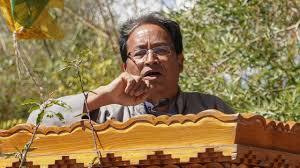

Wangchuk had launched a hunger strike on September 10, pressing for Ladakh’s statehood and Sixth Schedule safeguards. The fast ended when protests turned violent, but his associates said he anticipated arrest. They revealed the Sonam Wangchuk NSA order had been expected, given the government’s narrative blaming him for incitement.
The activist, known globally for climate action and a Magsaysay Award winner, had earlier termed the crackdown a “witch hunt.” He argued that unrest stemmed from deep frustration among Ladakh’s youth. He warned that scapegoating him through the Sonam Wangchuk NSA measure would only aggravate the crisis.
Legal And Political Context
The NSA, a 1980 law, empowers authorities to detain individuals for up to 12 months without trial. In Wangchuk’s case, legal experts said the Sonam Wangchuk NSA invocation raises questions of proportionality, as his activism has been peaceful. Lawyer Haji Mustafa, representing the Ladakh Apex Body, confirmed that strategies were being discussed to challenge the detention.
The UT of Ladakh was carved out in 2019 after Article 370’s abrogation. Since then, protests have erupted regularly over demands for statehood and protection of land, jobs, and cultural rights. The Sonam Wangchuk NSA action has added another layer of tension to an already fraught political environment.
Outlook And Way Forward
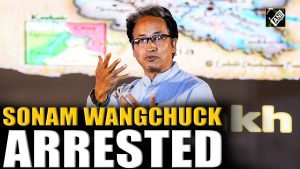

The government says dialogue with Ladakh leaders is ongoing, with progress on reservations, language rights, and recruitment. A meeting is scheduled for October 6. However, the Sonam Wangchuk NSA order has cast doubt on the sincerity of negotiations. Opposition voices warn that the move risks alienating Ladakh further.
The detention has become a flashpoint in the broader struggle between state authority and grassroots activism. For many Ladakhis, the Sonam Wangchuk NSA decision represents not just the silencing of a leader, but also a test of India’s democratic values.
Conclusion
The Sonam Wangchuk NSA detention has triggered sharp debate about governance, dissent, and Ladakh’s future. While authorities justify the move as a security necessity, critics call it politically motivated and damaging. Whether the order will calm or inflame Ladakh’s unrest remains uncertain, but its impact on India’s democratic image is already profound.

